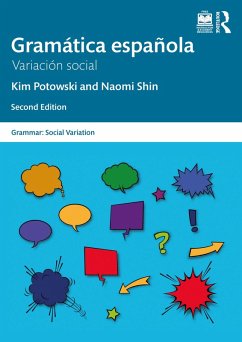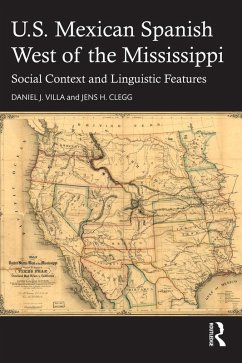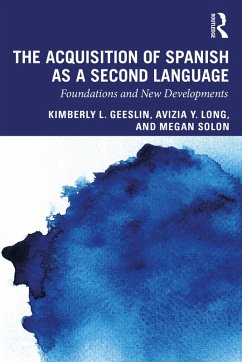
Data Representativity and Granularity in Spanish Syntax (eBook, PDF)
Subjecthood across Dialects and Methodologies in Spanish
Versandkostenfrei!
Sofort per Download lieferbar
39,95 €
inkl. MwSt.
Weitere Ausgaben:

PAYBACK Punkte
20 °P sammeln!
Data Representativity and Granularity in Spanish Syntax focuses on the dialogue between Generative Grammar, Variationism, and experimental linguistics with a unique emphasis on Spanish linguistics.Combining formal syntax and empirical data collection, this volume analyzes and compares various data collection methods in syntactic theory, and examines a wide variety of approaches to gain novel insight in this emerging area. Through the case study of subject properties in Spanish, with an emphasis on how differences in data collection and data analysis standards may shape our perception of the ob...
Data Representativity and Granularity in Spanish Syntax focuses on the dialogue between Generative Grammar, Variationism, and experimental linguistics with a unique emphasis on Spanish linguistics.
Combining formal syntax and empirical data collection, this volume analyzes and compares various data collection methods in syntactic theory, and examines a wide variety of approaches to gain novel insight in this emerging area. Through the case study of subject properties in Spanish, with an emphasis on how differences in data collection and data analysis standards may shape our perception of the object of study, this book addresses the following questions: (a) How do the data gathered through the standard methodology in each discipline diverge (if at all) and why? and (b) What kind of research questions can be answered with the standard methodology in each field? The volume argues for methodological crosspollination to avoid forcing data to conform to field-specific expectations and to appreciate language variation for what it has to tell us about linguistic theory, marrying the goals of Generative Grammar with data-driven research.
This is an essential resource for researchers in the area of formal and generative syntax, linguists with an interest in data collection standard in syntax, and graduate or advanced undergraduate students in the field of Spanish linguistics.
Chapter 2 of this book is freely available as a downloadable Open Access PDF at http://www.taylorfrancis.com under a Creative Commons Attribution-Non Commercial-No Derivatives (CC BY-NC-ND) 4.0 license.
Combining formal syntax and empirical data collection, this volume analyzes and compares various data collection methods in syntactic theory, and examines a wide variety of approaches to gain novel insight in this emerging area. Through the case study of subject properties in Spanish, with an emphasis on how differences in data collection and data analysis standards may shape our perception of the object of study, this book addresses the following questions: (a) How do the data gathered through the standard methodology in each discipline diverge (if at all) and why? and (b) What kind of research questions can be answered with the standard methodology in each field? The volume argues for methodological crosspollination to avoid forcing data to conform to field-specific expectations and to appreciate language variation for what it has to tell us about linguistic theory, marrying the goals of Generative Grammar with data-driven research.
This is an essential resource for researchers in the area of formal and generative syntax, linguists with an interest in data collection standard in syntax, and graduate or advanced undergraduate students in the field of Spanish linguistics.
Chapter 2 of this book is freely available as a downloadable Open Access PDF at http://www.taylorfrancis.com under a Creative Commons Attribution-Non Commercial-No Derivatives (CC BY-NC-ND) 4.0 license.
Dieser Download kann aus rechtlichen Gründen nur mit Rechnungsadresse in A, B, BG, CY, CZ, D, DK, EW, E, FIN, F, GR, HR, H, IRL, I, LT, L, LR, M, NL, PL, P, R, S, SLO, SK ausgeliefert werden.













